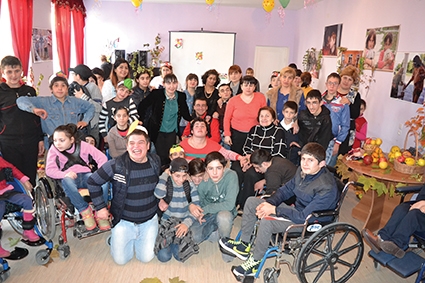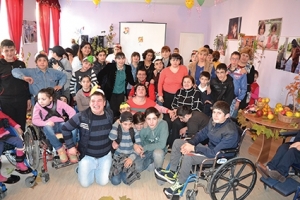In Need of a Financial Hug: Gori Welfare & Development Center
They help each other to enter the dining area, holding the door open, pushing the wheelchairs through, looking at me with interest as they greet me and smile at David Poppick, an American lawyer from New York who got involved in the Gori Welfare and Development Center after he came to Georgia as a Peace Corps volunteer and stayed in Gori. He’s been there for two years and is now moving on. David guides me through the day care center and I try to imagine becoming a part of it and to put into perspective my seemingly meaningless everyday worries.
The organization was founded in 2001, first as a club for disabled persons which united 25 people using wheelchairs, then, with financial assistance through grants from Mercy Corps, and the Embassy of Japan in Georgia and the Government of Japan, they moved into a building where the day care center can now be found.
The idea for a day center came after the 2008 August War when several refugee families with disabled children were taken in- at the time, the center served almost 200 children. Today they have 75 beneficiaries in Gori and also have a branch in Kareli with 15 children and 10 teachers.
“We have various workshop studios where our children can learn professional skills according to their abilities; we have a sewing workshop with equipment bought by the German Embassy in Georgia, within the SIDA project framework, and deaf-mute girls had a chance to learn sewing there,” says a founder of the center, Tina Bregvadze. The Welfare and Development Center has 60 children studying in their organization and four special teachers- four groups of disabled youth from 6 to 18 years, and 15 children from age 18. Psychologists and speech therapists work with these children on a daily basis. “The center in Gori also has ceramic and enamel workshops, though the ceramics one is closed,” Tina tells me, as they don’t have enough financial means to pay the teacher’s salary. As we talk with the center director, I sense a tiny nuance of despair - not in her voice, no, she’s all joyful and energetic and smiling, and yet, as she talks about the many things done, it all appears somewhere in the past tense, like the empty, spacious ceramics workshop we later visit, with the names of donors written on its walls. “Working with clay is very important, as it helps to develop small motor skills,” Tina says.
The maximum number of attendees is 15 and the age limit is 18, meaning after that they are forced to stay at home.
“Although there are 22 disabled people employed in the Shida Kartli region, the problem of employment for them remains critical,” Tamar Tavelidze, deputy of the center tells us. “It’s hard for people with disabilities to get an education. We’ve managed to send several of our beneficiaries to a professional college in Gori, but after graduating, they were unable to find employment and came back here to us. These children have no chance of a higher education, simply because, for example, our university in Gori is not adapted for people with special needs. Most of the classes are on the second floor and there are no ramps or adapted toilets. Even at school these children don’t get the education level they need to enter university. Although one of our students, Levan Makhatadze, is taking private classes and plans to do so,” Tamar said, adding that financing from their remaining partners- the Ministry of Health, and the local municipality – totals just 8 GEL per day per child.
Specialized teachers get just 140 GEL per month and both Tina and Tamar are concerned that although they have wonderful, trained teachers at the center, it is difficult to attract new teachers for the mentioned sum, especially considering that the work is so challenging.
“We’ve addressed the Ministry of Health asking for more funding and a higher quota,” Tina tells me. “Even if the financing of each child went up by just 3 GEL, that would already be something- we could at least afford to pay the bills, and have enough petrol for the buses that bring children to and from the day center. We hope things will change positively: we’re doing everything we can to meet the needs of these children”.
Another founder, Zviad Zviadadze, who runs the enamel workshop and also works at the Gori municipality, like Tina Bregvadze is wheelchair-bound. Zviad tells me he’s been teaching small groups of students (seven per group) at the center and is now waiting for a new project to start. “The Welfare & Development Center director has applied for grants from several international organizations and we’re waiting for results,” he says.
We asked David Poppick to tell his story. “In 1961, President Kennedy founded Peace Corps, and my brother served in a village in Turkey in late 1960s. Peace Corp is no longer in Turkey, but when I graduated high school, I went with him to that village to see what it was all about.” Inspired, he later requested a sabbatical, leaving New York and his career in law and coming to Gori, back in 2015, to provide organizational guidance to the center, from how to draft the center’s new policy manual, helping them with grant applications and contractual relations, to providing ethnic tolerance training, and trainings in financial literacy and human rights issues at the Gantiadi college and daycare center. He also conducted trainings in employability skills, and worked as a member of the Peace Corps Georgia Gender Equality Committee for the other Peace Corps volunteers in Georgia. He collaborated with lawyers at Partnership for Human Rights and the Public Defender of Georgia Equality Committee about rights of persons with disabilities and gender equality to help them with their legal work in Georgia about those issues. “In the two years I’ve been here, it’s difficult for me to say I’ve witnessed change, but what I have seen is that there remains a tremendous amount that needs to be done to accommodate people with disabilities. There are thousands of people in Shida Kartli who need education and this organization can accommodate only fifty. Many are deprived from what the laws of this country state should be provided for those with disabilities,” David says. He then names education, employment, and accessibility as the three core principles that are essential to meet the needs of people with disabilities.
David says coming to Georgia was no shock for him; on the contrary, he says, he “was well aware of the challenges ahead,” something completely different from what his life was like in the US. Now, returning back to New York, to his family and colleagues, he’ll cherish the memories of the people he met during these two years in Georgia. “The people I became friends with at work, socially, at home in Kareli gave me my favorite memories of Georgia,” David says.
As we finalize the interview and my visit, David kindly offers to accompany me to the minibus stop. As we say our goodbyes, a young girl who I last saw in the center, comes up to us and, having been told by Tamar she loves to be hugged, get ready to do just that. But suddenly she dives down and ties up my shoe lace, only giving me a hug once I’m free from the risk of tripping.
In the background are the screams and joyful shouts from children in a state school just around the corner. The children there are happy and secure. Their voices are heard. Lucky them.
Nino Gugunishvili












